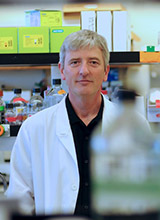
By modeling normal and diseased human organs on a small scale, researchers believe they can greatly improve the discovery of drug compounds that can target specific tissue cells, including cancer cells. Professor Christopher C.W. Hughes (Molecular Biology and Biochemistry) has created a miniature model organ system capable of mass production, and effective use in high throughput drug screening. Professor Hughes’ “Organs-on-a-chip”, are simple and user friendly, extractable for gene expression analysis, and highly replicable.
In a study recently published online in the Royal Society of Chemistry’s journal Lab on a Chip, Professor Hughes and his team successfully established multiple vascularized micro-organs (VMOs) on an industry standardized 96-well plate. The VMOs represent a microphysiological organ model system that has flow of a blood substitute through vascular and perivascular cells that can deliver nutrients to different types of tissues, such as heart or brain tissue. Professor Hughes’ team was also able to establish a functional vascularized microtumor (VMT) within the 96-well plate system, and demonstrated its potential for anti-cancer drug screening.
Along with Professor Hughes, Duc Phan, Xiaolin Wang, Brianna Craver, Agua Sobrino, Da Zhao, Jerry Chen, Lilian Lee, Steven George, and Abraham Lee also contributed to the study. The study was supported by grants from the National Institutes of Health, UCI, and the National Natural Science Foundation of China.
